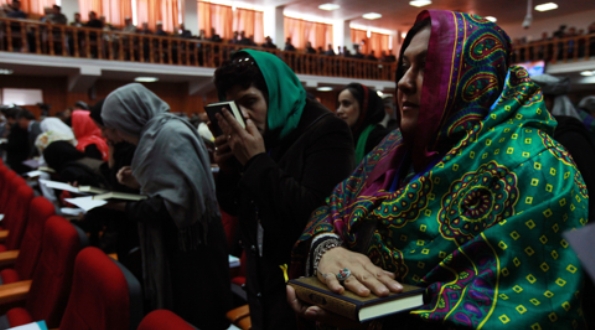BECOME A MEMBER
>JOIN
Verbal Attacks Against Afghan Women Parliamentarians Increase

It takes a lot to rattle Shukria Barakzai, a staunch defender of women's rights and one of more than 20 very outspoken women members of parliament in Afghanistan.
But even though she's run two successful parliamentary campaigns and has taken on conservative members of Afghan society, she is shocked by how easily some male members of parliament are now publicly threatening their female counterparts in the middle of parliamentary meetings.
“A (male) member of parliament stood up in our general meeting yesterday and said parliament is not a place for women, your time is up here, you must not pursue this fight for women's rights,” says Ms. Barakzai.
For many of the Afghan women leaders, dealing with sexism and discrimination isn't anything new. But women's rights activists say that male parliamentarians have recently intensified a war of words inside parliament. It's a war that many Afghan women worry echoes a greater issue in society and could reverse public tolerance and support for women's rights.
“I've noticed the rhetoric around women's issues has changed, and conservative members of society and parliament are once again feeling safe to verbally attack women publicly,” says Barakzai. “The Afghan government isn't doing anything about these kinds of public threats and attacks on women. It is almost as if they agree with the conservatives.”
The actions of the male parliamentarians are just one of many reminders to Barakzai and other women here that as the international security forces, foreign diplomats, and advocacy organizations prepare to leave the country in 2014, Afghan women will be left without a key source of support.
“I feel like Afghan women are right at the gate of realizing their civil and political rights but the international community is too busy packing up to notice that these rights are already starting to erode,” says Horia Mosadiq, a Human Rights Researcher for Amnesty International.
High levels of domestic violence against women and the targeting of women leaders by the Taliban and other armed groups only compound matters.
The Afghanistan Independent Human Rights Commission documented more than 4,000 cases of violence against women from March 21 to Oct. 21, 2012 — a rise of 28 percent compared with the same period for 2011. Though some of the increase in violence is attributed to growing public awareness and better reporting of violence against women, it is still concerning, say activists.
Several women leaders were also killed in 2012, including two directors of the Department of Women's Affairs, a branch of the Afghan government, in the eastern province of Laghman. Both women were strong advocates for the equal treatment of women.
“Afghan women have faced these challenges all along, but the difference now is that the timeline for the international community to completely disengage is nearing, after which these conservatives will feel even more forceful in imposing their restricted views and values over people and reversing many of the legal and professional gains Afghan women have made in recent years,” says Orzala Ashraf Nemat, an Afghan women's rights activist and founder of the nonprofit organization Humanitarian Assistance for the Women and Children of Afghanistan. “The mood is changing.”
Originally published on TribLIVE.

